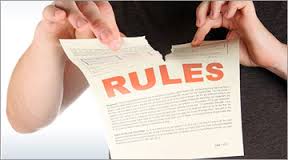Rebellious and Defiant Teens
One of the most difficult parenting situations that come up around the world is that of rebellious and defiant teens. It is true that most teenagers rebel to some degree. They are testing their limits, and learning to be individuals. It is only natural to rebel a little bit in order to develop a sense of self. However, asserting individuality and testing the boundaries is a different proposition from outright rebellion and defiance.
Rebellious and defiant teens have a disdain for authority, and show little desire to work with parents, teachers and others. They repeatedly cross the line, and may show outright disrespect, flouting rules constantly, or ignoring your strictures. Dealing with rebellious and defiant teens is difficult, and you can only do your best. Here are some ideas for trying to deal with rebellious and defiant teens:
Do what you can to enforce boundaries
It is important to show your rebellious teenager that there are still rules. This means doing your best to enforce consequences. No, you probably can’t stop him or her from sneaking out the window at night. However, you can take away computer privileges or video games. You can also remove car privileges and make it clear that if your child wants to benefit from the extra, “fun” things you have as a family, he or she needs to be a functioning and respectful part of the family. Try these teen behavior contracts.
Try to avoid big fights
This can be difficult, but you need to try to avoid big fights. Part of the reason that defiant and rebellious teens act out is to get a reaction from you. One of the best things you can do is react calmly. Explain that the poor decision that a teenager has made is resulting in a specific consequence (try to choose consequences that you can actually enforce), and that he or she can earn back your trust.
Big fights over a teenager’s hair or clothes will only put you in a losing position. Calmly state that you do’t approve of something your teen is wearing, saying, or listening to, and leave it at that. If the behavior is offensive, you can enforce consequences.
Be available to talk
Try to be available to talk. Listen to your teenager. If he or she comes to you with a problem, or confesses something he or she did, hold your tongue until he or she is done. While it may be difficult, try to avoid making judging statements. If your teen wants advice, give to him or her candidly and calmly. If he or she is admitting wrong-doing, calmly point out that there is a consequence attached to all such actions, and that it will be enforced. Try to help your teen, or just listen on occasion.
Be clear in your unconditional love
It is difficult, but when dealing with rebellious and defiant teens, you need to be clear about your unconditional love for your teenager. Make sure that you are clear that it is the behavior you do not approve of. Also, do your best to avoid comparisons between your troubled teenager and others. These comparisons will most likely only provoke more efforts to rebel as teens feel unloved.
Continue to invite your troubled teenager to family activities, and express a desire for your child to join the table at meal times. Be sure that you continue to provide the basics of life: Shelter, food and clothing. However, you do need to make it clear that you will not tolerate violence in your home, and that your teen should not endanger anyone else in the family.
Programs for rebellious and defiant teens
If your teenager has become so unmanageable that he or she is engaged in illegal activities, or becoming violent, you might have to look into programs for your teenager. Make it clear that you love your teen, and you want to help him or her, but you can’t have destructive behavior in your home. Programs for rebellious teens can help your teenager learn techniques to manage his or her anger issues and problems. In these cases, your teen might still have problems when he or she gets back from the program, but they might be more manageable.
It can be difficult to know what to do if you have a troubled teenager. You should do what you can to re-establish a good relationship with your teenager, and show that you are concerned and loving. In the end, though, all you can do is try your best, since rebellious and defiant teens make their own decisions.
